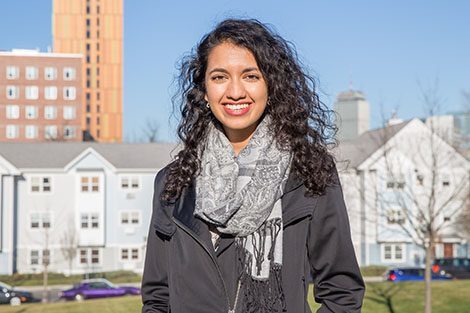December 16, 2015 — As an undergraduate at McGill University in Montreal, Anvita Kulkarni, SM ’16, had a passion for social justice and health equity. Two years ago, she stumbled across an online course, Health and Society, taught by Harvard T.H. Chan School of Public Health Professor Ichiro Kawachi on HarvardX. The course framed these issues through a public health lens, which was a new perspective for her. Inspired, she applied to the School and was accepted into the master’s program in Social and Behavioral Sciences. Now, Kulkarni is putting into practice what she’s learning about how social variables such as race and income affect health.
Last summer, she worked with the School’s Prevention Research Center evaluation team on the REACH (Racial and Ethnic Approaches to Community Health) Obesity and Hypertension Demonstration Project—a series of interventions funded by the Centers for Disease Control and implemented by the Boston Public Health Commission. Kulkarni worked on data collection and had the opportunity to visit and learn from organizations and hospitals throughout the city.
“I was able to get a sense of the experiences and challenges of the organizations working with the interventions, which were things like reducing the level of sodium in the food they served. And then I had the challenge of grappling with the messiness of evaluating the program,” Kulkarni said. “I wound up loving the job.”
Since last spring she has been immersed in a new challenge—organizing health promotion activities at the YWCA Cambridge Tanner Residence, which houses about 100 adult women who are experiencing homelessness or housing instability. Kulkarni was one of 16 graduate students from health professional schools across Boston chosen this year as a Boston Schweitzer Fellow, and is working with Tanner for a twelve-month direct service project as part of the fellowship. Each week, she meets with residents to facilitate workshops focused on how to incorporate healthy choices into their hectic lives. Topics have included easy ways to cook with vegetables, and self-care strategies. The workshops are informal and discussion-focused, and provide an opportunity for women to share strategies with each other and build community.
It’s been a learning experience on multiple levels, Kulkarni said. Although she has built trusting relationships with a number of the women, attendance at the workshops has not always been as high as she’d hoped. But she’s putting her focus toward making the program sustainable, forging connections with local organizations that can bring resources on-site such as physical activity classes, and pulling together data on what’s worked and what hasn’t so that the next person in her role will have a head start.
“This fellowship has pushed me to think about the lives of the people behind the data points we study,” Kulkarni said. “In the academic literature, women like those I work with are lumped into ‘the homeless population,’ but all of their experiences are so different. I’ve been working on adapting my programs to accommodate their different needs and experiences.” Kulkarni tweaks the format of her workshops based on the participation styles of the women who attend on a particular day, and is reading up on trauma-informed care and other ways to make the material more accessible, she said.
Kulkarni came to Harvard Chan School hoping to gain the tools to work toward improving health equity regardless of race, income, neighborhood, or other factors. Through meeting other students, she’s broadened her perspective on the ways that public health professionals can interpret and act on that goal. And she sees herself contributing in more ways than she thought would be possible. She is considering medical school, and sees herself possibly working in primary care and teaching, while also pursuing research and social justice work.
“I’ve felt more empowered as a result of coming here,” she said. “I want to do a little bit of everything, and I believe that I can.”
Photo: Craig LaPlante
